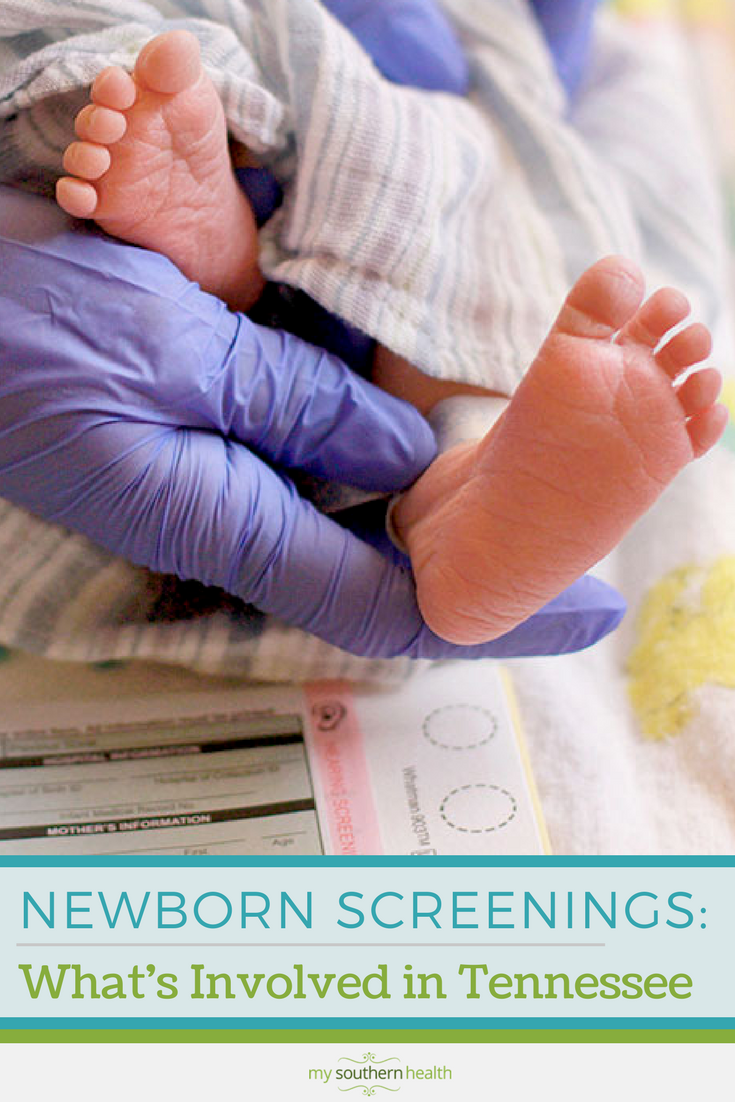A simple blood sample tests for 69 serious problems; most can be treated if caught quickly.
Every expectant parent’s greatest hope is for a healthy baby. Thankfully, most babies are born healthy. However, sometimes a baby is born with a rare and possibly life-threatening disease that wouldn’t be immediately obvious. Early detection and intervention can prevent long-term complications or even be life-saving. That is why Tennessee and many other states require newborn tests after birth.
Here’s an example of how neonatal screening tests works:
A mom notices that her 4-day-old is not feeding well and is sleepy and difficult to arouse. She calls her pediatrician, who has just received a call from the state Department of Health with results that the baby’s blood tested positive for a disorder called MCAD deficiency, which keeps the baby from breaking down fats in food for energy. Without treatment, this can lead to dangerous drops in blood sugar levels, seizures and coma. Other things can cause the baby’s symptoms but because of the newborn screening results and talking to her baby’s pediatrician, the mom knows to take the baby to the emergency room, where specialists confirm the diagnosis and begin treatment right away.
Here’s what newborn screening in Tennessee involves:
- A blood test. Before your newborn is discharged from the hospital, between 24 and 48 hours of age, a tiny bit of blood – only six drops – will be taken from the heel. The sample will be tested for 69 diseases, including metabolic problems such as MCAD deficiency, thyroid disease, cystic fibrosis and certain blood diseases, including sickle cell trait or disease. This allows for earlier detection and treatment of these rare disorders, which may improve the baby’s long-term outcome and quality of life.
- A hearing test. Your baby’s hearing is also tested prior to discharge from the hospital. Early detection and treatment of hearing loss in infants can improve hearing and learning language skills, which are important for communication and eventual school performance.
- Heart disease screening. A small, non-invasive probe is placed on a baby’s foot to check the oxygen levels in the blood. The result of this test can determine the need for further testing to diagnose a possible heart defect, which could be a life-threatening problem if not detected and treated early in life.
Neonatal screening has been saving lives and improving the health of babies in Tennessee since the 1960s. Most babies will have normal newborn screening results, but it is very important that all infants in Tennessee have these screening tests. Sometimes your infant may need a repeat blood test due to an unsatisfactory specimen. Your baby’s pediatrician has an important role in coordinating any follow-up testing that may be required for your baby as a result of newborn screening.
If you receive a letter from the state health department to let you know that your newborn’s results suggest follow-up, it is important to follow up with your pediatrician. And as always, if your newborn seems sick or you have any concerns, call the pediatrician, as sometimes symptoms of these diseases may develop before the results of the screening are available.
You can learn more at the Tennessee Department of Health newborn screening website.
This post was written by Susan Elliott, a certified Neonatal Intensive Care Nurse and a Clinical Nurse Specialist in the NICU at the Monroe Carell Jr. Children’s Hospital at Vanderbilt. She coordinates the newborn screens and follow-up for the NICU and Newborn Nursery patients, assists with NICU and Newborn Nursery staff education, and is a neonatal resuscitation program course instructor.





